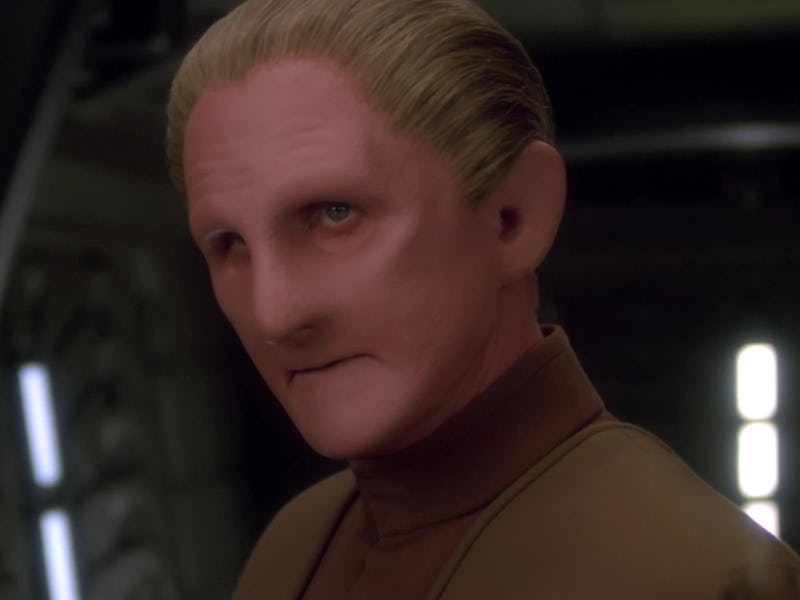Deep Space Nine Was At Its Best When It Questioned Its Own Characters
Who are you really loyal to?

In the eighth episode of Star Trek: The Next Generation, “Justice,” Wesley Crusher is sentenced to death on an alien planet for what the Enterprise crew views as a light misdemeanor. In a typically clunky Season 1 of TNG way, “Justice” demonstrated the difficulty of navigating interstellar laws as peacekeeping diplomats, but Wesley’s crime clearly reads as a trivial mistake that shouldn’t result in his execution.
Six years later, Star Trek was exploring new frontiers with Deep Space Nine, in which Starfleet inherited a static outpost from imperialist Cardassians and worked alongside the newly liberated Bajoran people. Several of its early episodes felt like evolutions of trivial TNG ones, with these unofficial updates showing the series’ keenness to grapple with the more complicated side of cosmic exploration.
Thirty years ago, one such episode altered the relationship between two fan-favorite characters in a way no other Trek show had dared. Season 2’s “Necessary Evil” revealed a historic crime committed by second-in-command Kira Nerys (Nana Visitor), which challenged the unflinching moral code of security chief Odo (René Auberjonois). The episode isn’t just about justice, but allegiance: a non-Starfleet character choosing to conceal another’s crime showed that being a badge-wearing Federation devotee wasn’t a flawless code to live by.
Under Cardassian rule, Deep Space Nine was a cold, shadowy place.
The station’s slippery bartender Quark (Armin Shimerman) gets shot while trying to steal an old list of Bajoran names for a client, and in attempting to find the shooter, Odo starts reminiscing about his first duty as an investigator on the station five years prior, during the Cardassian occupation. As a “neutral observer” to the captive Bajorans, Odo was enlisted to weed out the killer of a chemist called Vaatrik, and his widow immediately points him towards a young newcomer she thinks her husband was sleeping with. This is how Odo first met Kira.
Even in their currently unremastered state, the flashbacks to Terok Nor (DS9’s original Cardassian name) are gorgeous and chilling: muddy, shadowy noir visuals paired with a soundscape dense with mechanical droning. Characters slink from one suspect to another, turning suspicious eyes on Odo at every turn. Is he a Cardassian collaborator? Has he convinced himself that he’s an altruistic keeper of objective justice?
At this point in the show, the shapeshifting Odo still thinks he’s the only one of his kind, and his lack of community and distorted sense of self draw him to wherever he thinks he’ll be most useful. He originally thought Kira didn’t kill Vaatrik but did commit illegal sabotage as a member of the Bajoran resistance, and so he covers up for her — it’s clear enough to him even then that resisting cruel authoritarian occupiers is an upright thing to do. But when it’s revealed that someone tried to kill Quark to get their hands on a stashed list of Bajoran collaborators during the occupation, he gradually lands on a deeper, buried truth. Vaatrik was a traitor, and Kira killed him for it.
We watch Kira and Odo stand opposite in Odo’s office, now both clad in official Bajoran uniforms, their stern professionalism melted away into something vulnerable, wounded, and sympathetic. Odo says, with the smallest hint of playfulness, that Kira’s crime could stay between them. She asks if he will ever be able to trust her again. He doesn’t have an answer. The episode fades out on the pair of them standing silently, with Odo bowing his head in resignation.
Odo and Kira have a long, complicated relationship, but Deep Space Nine wasn’t afraid to mess with it early.
Sabotaging the Cardassians is understandable — even admirable — but taking a fellow Bajoran’s life challenges the most fundamental tenets of Odo’s philosophy. His duty to Bajor and Starfleet demands he turn his colleague in. But Odo is not Bajoran, and he is not a member of Starfleet. He is Kira’s friend, and clearly empathizes with her position. The gulf between what Odo thinks is right and what his duty compels him to do has never been more vast, and even though he chooses to protect his friend, he cannot see her in the same way ever again. But, in some way, he does know her better.
In another classic Wesley TNG episode, “The First Duty,” Picard screams at the boy for denying his collusion in the cover-up of a fatal flight school crash. There, justice was conveniently defined – honesty must always come before self-protection. But what if you exist between the lines, in the transitional period from oppression and liberation, sandwiched between two power structures that don’t offer you true belonging?
In questioning the allegiance of a character whose steadfast moral code counterbalanced his deep alienation, “Necessary Evil” undermines the loyalty of any prior or future Trek character, because it shows us conditions exist that can sever their loyalty to the institutions they exist to protect. Odo ends the episode face-to-face with the faults in his own morality, and realizes, to paraphrase an iconic DS9 line, he can live with it. It’s a moment that sums up how subversive DS9 wanted to be with Trek values better than anything else.